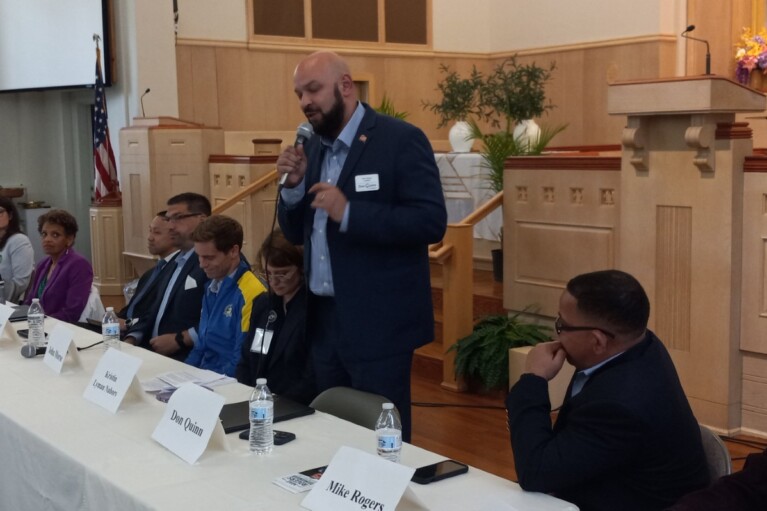Lawmakers Considering How to Remake State’s Environmental Justice Commission

Maryland’s General Assembly is paying closer attention to communities that have borne the brunt of pollution and other environmental injustices.
Senate President Bill Ferguson (D-Baltimore City) created the Advisory Workgroup on Equity and Inclusion last summer, after a series of brutal police encounters around the nation left many Black people dead.
Environmental justice — which refers to the idea that no population, regardless of race, national origin or income, should bear a disproportionate share of negative environmental consequences — was one of the three areas that Ferguson set as priorities for the group to review.
The workgroup recommended revamping the state’s Commission on Environmental Justice and Sustainable Communities (CEJSC), a 20-member body formed two decades ago.
The commission’s mandate is to advise state agencies on environmental justice issues, to assess how current state laws address environmental inequities and to develop criteria to determine which communities may be disproportionately hit by environmental degradation.
The commission, which is required to make an annual report, received criticism last summer for failing to influence any meaningful policies or to engage with communities beset by environmental injustices.
In a letter to Gov. Lawrence J. Hogan Jr. (R) in August, a group of Maryland organizations and community leaders called for the commission to have more authority so that it could influence decision making in state agencies that control pollution sources in the state.
Commissioners responded with a promise to be more effective this legislative session.
To reinvigorate the commission, Senate Bill 674, sponsored by Sen. Sarah K. Elfreth (D-Anne Arundel), would change the makeup of the commission to reflect the “racial, gender, ethnic and geographic diversity of the state.” And it would require the commission to include more representatives from communities impacted by environmental justice issues, local government and academia.
Elfreth’s proposal more specifically defines the commission’s duties and would require it to submit policy recommendations and findings to the General Assembly, as well as to the governor.
Members would no longer be appointed solely by the governor. The commission membership would increase from 20 to 22, with six members appointed by the governor, eight appointed jointly by the presiding officers of the House and Senate, one senator appointed by the Senate president, one delegate appointed by the House speaker, and six appointed by the secretary of the Maryland Department of the Environment.
MDE would be required to orient new commission members on environmental justice issues in the state and on the commission’s previous work.
The commission would be required to meet at least six times a year, at least once in a rural area and once in an urban area. The bill also would require CEJSC to coordinate with the Commission on Climate Change, to use updated data sets and mapping tools to review state laws related to environmental justice. And, after gathering public input, CEJSC would have to propose a list of projects that address environmental justice issues.

Sen. Sarah K. Elfreth (D-Anne Arundel)
“We do our best work in the General Assembly when we have partners and various boards and commissions that spend their time really digging deeply into the most critical issues and challenges facing our state,” Elfreth said.
“The environmental justice commission has the opportunity to do a much better job at studying, vetting and most importantly, coming up with policy solutions that are really from the ground up…and having tools that help them do more than just discuss an issue.”
However, some advocates say that the commission, as revamped under Elfreth’s bill, still would not have enough clout to be effective.
“The commission in this bill still has no power, still has no authority,” said Sacoby Wilson, an associate professor at the University of Maryland School of Public Health. The commission should “have teeth, have the ability to provide feedback on legislation, have the ability to inform permitting discussions when it comes to cumulative impacts, have the ability to say ‘hey are you in compliance with Title VI [of the Civil Rights Act of 1964],’” he continued.
At a CEJSC meeting last month, Al Weaver of the BTB Coalition, a civic group based in Brandywine, suggested creating an environmental justice office, which, unlike the commission, would have jurisdiction to coordinate with all state agencies and uphold Title VI of the Civil Rights Act of 1964 — which seeks to prevent discrimination by any publicly funded educational institution.
Sen. Melony G. Griffith (D-Prince George’s), chair of the Senate Workgroup on Equity and Inclusion and co-sponsor of SB 674, said the bill is an effort to make the environmental justice commission more relevant. And the first step is to ensure the commission is made up of people best equipped to address environmental justice issues, she said.
“I think [the commission] has been operating sort of on autopilot,” Griffith said. “Let us hit the reset button with this newly constituted, well-oriented commission that has a newly refreshed and updated charge. Let’s give them a chance was to get their new leadership elected and get their arms around their mission. Let’s give them a chance to succeed.”
Typically, a commission is formed to advise the General Assembly and the governor on an issue deemed a priority for the state. And lawmakers then can choose to turn some commission recommendations into law, Griffith said.
“Should we find that the newly constructed commission needs additional responsibilities or authority, we’re back here every year and we can update it,” Griffith said.
The proposal is a good first step, but the commission should be provided more resources, such as geospatial tools, to analyze environmental impacts on disadvantaged communities, said Ramon Palencia-Calvo, director of Chispa Maryland, a Latino organizing program for climate change.
The commission should also be required to collaborate with groups such as the Office of Minority Health and Health Disparities, which has expertise and data necessary to create substantial policy recommendations, Palencia-Calvo said.
However, the real problem may lie in the culture of state agencies that often treat justice as an afterthought, said Fred Tutman, the Patuxent Riverkeeper. An effective commission is one that is “organically connected to the suffering that exists within the state” and is not afraid to spotlight structural sources of environmental injustice, which may be difficult for a politically formed commission to do, he said.
The Maryland Department of the Environment released its own environmental justice implementation plan at the end of last year. That plan is meant to enhance the environmental justice culture within the agency, MDE staffer Devon Dodson said during a virtual commission meeting late last month.
“The commission and its supporting agency, MDE, are engaging constructively with the legislature and coordinating with other agencies and partners to ensure recommendations can be implemented effectively and efficiently,” MDE Secretary Ben Grumbles wrote in an email to Maryland Matters.

Del. Tony Bridges (D-Baltimore City)
The first hearing on the bill is scheduled for Feb. 24. The House version of the legislation, sponsored by Del. Tony Bridges (D-Baltimore City), will be heard on Feb. 26.
Other bills that address the Environmental Justice Commission
Sen. Paul G. Pinsky’s (D-Prince George’s) sweeping Climate Solutions Now Act of 2021 requires the environmental justice commission to recommend a system for identifying communities most affected by climate change, to recommend ways to build climate equity and to figure out percentage of state funding that should be invested into affected communities.
Sen. Obie Patterson (D-Prince George’s), who sits on CEJSC, has filed a bill that would require the commission to recommend strategies to increase state oversight of local zoning decisions that pose environmental justice concerns.
Del. Samuel I. Rosenberg (D-Baltimore City) is again sponsoring a bill that would require the commission to develop policy recommendations to place “highest priority on overall spending on clean energy and energy efficiency programs, projects, and investments in the state to benefit low-income communities.”
In previous meetings, some members said they are hampered because they have limited authority in holding state agencies accountable on environmental justice issues. Currently, the commission’s greatest powers are to “review and analyze the impact of current State Laws and policies on the issue of environmental justice and sustainable communities” and to advise state agencies and the governor.
But commission members said they may not be able to handle such additional responsibilities, at least not without more resources.
“I feel like now we’ve gotten what we’ve asked for, but now we’re afraid of what we’ve got,” Stephan Levitsky, the vice president of sustainability in Perdue Farms and business representative on the commission, said during a virtual commission meeting.
The commission’s members receive no compensation, but can call on staff from MDE for research and policy advice.
“I certainly don’t want to let the citizens of Maryland down in any way. I don’t want to over promise and underperform. I want to be very realistic about what we can do,” CEJSC’s Chair Camille Burke said in a virtual commission meeting. For instance, the commission would need assistance from local governments under Patterson’s bill, she said.
“The state of Maryland has all the resources; we have the academic institutions,” she said. “We just have to figure out the best way to avail ourselves to each of those resources and balancing that with getting work done.”




 Creative Commons Attribution
Creative Commons Attribution